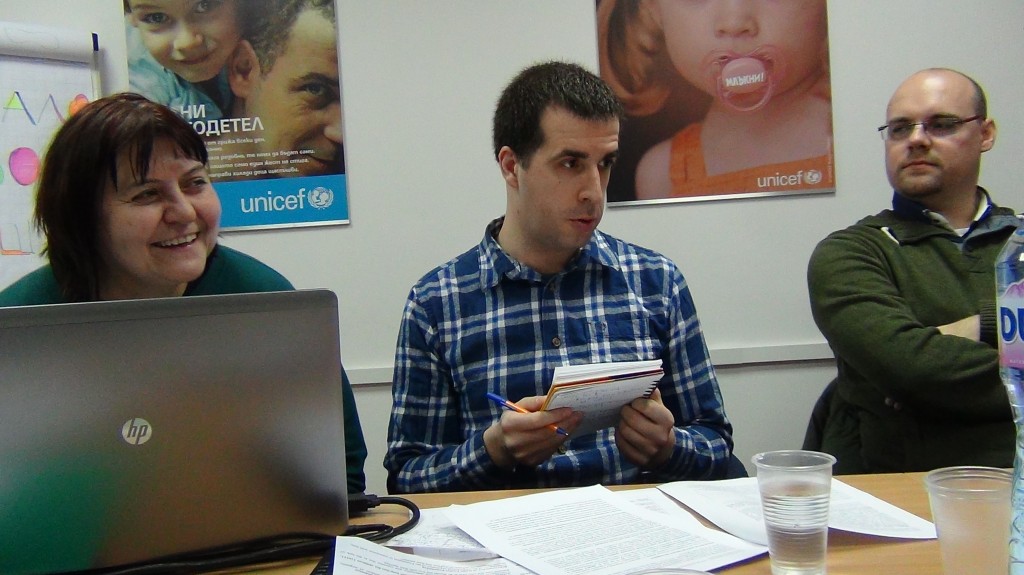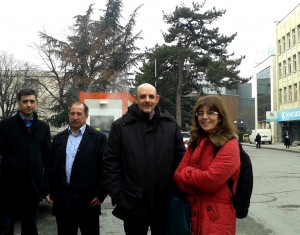Bulgarian national meeting: a focus on the situation of children left behind
 The first National Meeting of the Grundtvig project “Advanced Training Programme on Transantional Families Support” was held on the 23rd - 24th of January in Sofia, Bulgaria. The focus of the Bulgarian National event, organized by Partners Bulgaria Foundation, was to analyze the situation of the children of migrant parents in order to identify the educational needs of the stakeholders involved with transnational families.
The first National Meeting of the Grundtvig project “Advanced Training Programme on Transantional Families Support” was held on the 23rd - 24th of January in Sofia, Bulgaria. The focus of the Bulgarian National event, organized by Partners Bulgaria Foundation, was to analyze the situation of the children of migrant parents in order to identify the educational needs of the stakeholders involved with transnational families.
Partner Bulgaria Foundation developed an in depth country analysis on the current situation of children left behind, producing a qualitative and quantitative research. Although the lack of official data, it is evident that the phenomenon has been increasing in the last years.
During the first day partners attended a round table on the socio-psychological aspect of children left behind that reunite the most important organizations working on the topic: Partners Bulgaria Fundation (moderator) Unicef Bulgaria, Bulgarian National Help – line, the State Agency for Child Protection and the Agency for Social Assistance.
The phenomenon of migrant parents has been spreading consequences on families ties that need to be deepened and studied. Unicef Bulgaria is also producing a survey on the topic, they pointed out some remarkable findings. First of all they underlined that in Bulgaria 26% of minors have a parent working abroad, moreover there are some trends in the migration flux, for example the majority of the migrant mothers come from the rural area meanwhile most of the migrant fathers from the cities. The Turkish minority has particularly high migration rates: 70% of families have a member working abroad.
The State authorities are aware of the consequences of migration on families ties but they are still gathering data and information, therefore the aim is to create a social system able to take care of this vulnerable group without stigmatizing it.
 The partners of the project had also the opportunity to visit the city of Dupnitsa, a city 100 km from Sofia considerably hit by migration phenomenon, where Partner Bulgaria Foundation provides support to vulnerable children and to the community. At the Municipality hall partners met the stakeholders in a fruitful roundtable where they share their experiences and good practices; some case study has also been presented and analyzed. Partner Bulgaria Foundation reported the first findings of the focus group with children of migrants parents and with the stakeholders working with minors in Dupnitsa. The case presented was particularly interesting since it showed that in this community the children manage the separation from their parents quite positively also thanks to the class teachers who keep a contact with them.
The partners of the project had also the opportunity to visit the city of Dupnitsa, a city 100 km from Sofia considerably hit by migration phenomenon, where Partner Bulgaria Foundation provides support to vulnerable children and to the community. At the Municipality hall partners met the stakeholders in a fruitful roundtable where they share their experiences and good practices; some case study has also been presented and analyzed. Partner Bulgaria Foundation reported the first findings of the focus group with children of migrants parents and with the stakeholders working with minors in Dupnitsa. The case presented was particularly interesting since it showed that in this community the children manage the separation from their parents quite positively also thanks to the class teachers who keep a contact with them.
Therefore it is possible to point out that the children of migrant parents are a vulnerable group but not always a group at risk. Statistics indicate different reactions of the minor depending from multiple variable, for example the situation could vary from the rural village to the city, if it is the father or the mother that leaves, obviously it always imply a structural change in the life of the minor.
Thanks to the presentation of the Romanian case made by Alternative Sociale and the polish case made by Polish Migration Forum, it was possible to compare the situation at European level and to reveal a common pattern of the phenomenon of children left behind: decrease in health assistance, eating habits worsening, behavioral problems, poor school results and low educational ambitions, assumptions of alcohol and drugs.
Finally, it is important to keep studying the phenomenon and to raise attention of the national and European institutions in order to foster policies that prevent children to be affected by the consequences of European mobility.

